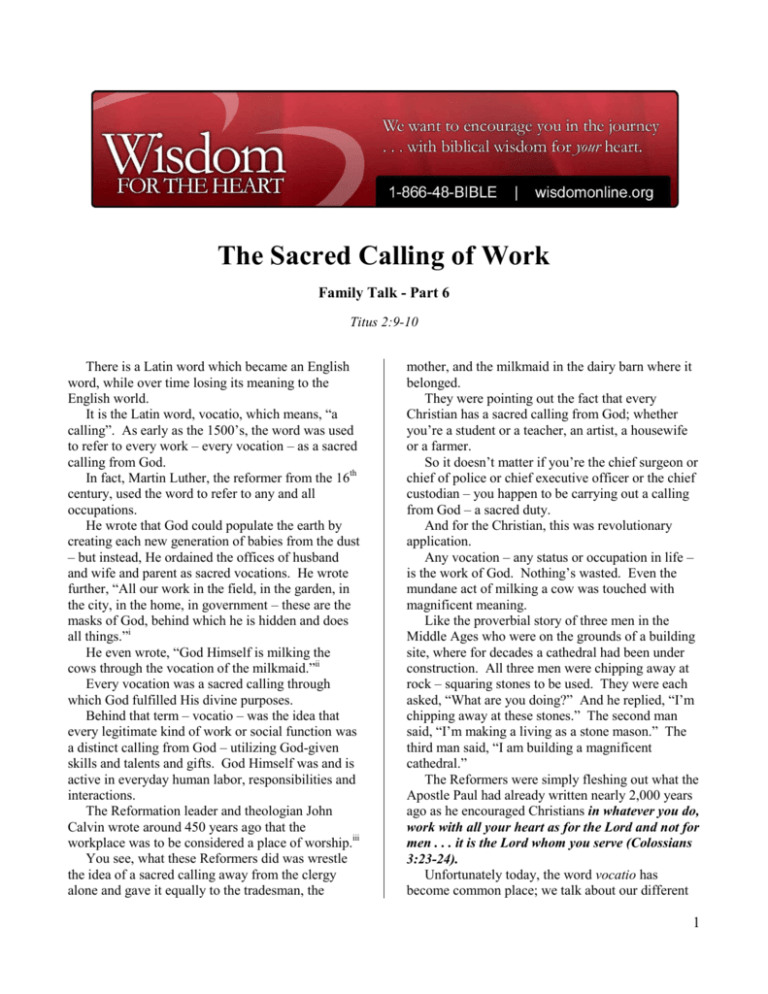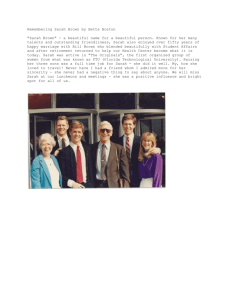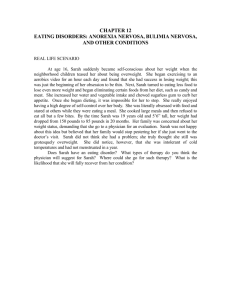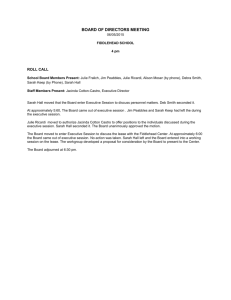
The Sacred Calling of Work
Family Talk - Part 6
Titus 2:9-10
There is a Latin word which became an English
word, while over time losing its meaning to the
English world.
It is the Latin word, vocatio, which means, “a
calling”. As early as the 1500’s, the word was used
to refer to every work – every vocation – as a sacred
calling from God.
In fact, Martin Luther, the reformer from the 16th
century, used the word to refer to any and all
occupations.
He wrote that God could populate the earth by
creating each new generation of babies from the dust
– but instead, He ordained the offices of husband
and wife and parent as sacred vocations. He wrote
further, “All our work in the field, in the garden, in
the city, in the home, in government – these are the
masks of God, behind which he is hidden and does
all things.”i
He even wrote, “God Himself is milking the
cows through the vocation of the milkmaid.”ii
Every vocation was a sacred calling through
which God fulfilled His divine purposes.
Behind that term – vocatio – was the idea that
every legitimate kind of work or social function was
a distinct calling from God – utilizing God-given
skills and talents and gifts. God Himself was and is
active in everyday human labor, responsibilities and
interactions.
The Reformation leader and theologian John
Calvin wrote around 450 years ago that the
workplace was to be considered a place of worship.iii
You see, what these Reformers did was wrestle
the idea of a sacred calling away from the clergy
alone and gave it equally to the tradesman, the
mother, and the milkmaid in the dairy barn where it
belonged.
They were pointing out the fact that every
Christian has a sacred calling from God; whether
you’re a student or a teacher, an artist, a housewife
or a farmer.
So it doesn’t matter if you’re the chief surgeon or
chief of police or chief executive officer or the chief
custodian – you happen to be carrying out a calling
from God – a sacred duty.
And for the Christian, this was revolutionary
application.
Any vocation – any status or occupation in life –
is the work of God. Nothing’s wasted. Even the
mundane act of milking a cow was touched with
magnificent meaning.
Like the proverbial story of three men in the
Middle Ages who were on the grounds of a building
site, where for decades a cathedral had been under
construction. All three men were chipping away at
rock – squaring stones to be used. They were each
asked, “What are you doing?” And he replied, “I’m
chipping away at these stones.” The second man
said, “I’m making a living as a stone mason.” The
third man said, “I am building a magnificent
cathedral.”
The Reformers were simply fleshing out what the
Apostle Paul had already written nearly 2,000 years
ago as he encouraged Christians in whatever you do,
work with all your heart as for the Lord and not for
men . . . it is the Lord whom you serve (Colossians
3:23-24).
Unfortunately today, the word vocatio has
become common place; we talk about our different
1
careers, our vocations, our vocational training
independently of anything sacred.
Today the motive for work has been reduced to a
paycheck and the incentive for work has become the
weekend and the ultimate goal for work is
retirement.
The average American dream is to be done with
work, never having to serve anyone ever again.
The Apostle Paul is about to clarify the meaning
of work for the church as he addresses a family
member of the average household on the island of
Crete – the ordinary household servant.
It will be to the slaves that Paul will clarify, that
common everyday work happens to be worship – a
platform upon which the glory of Christ can be seen
and honored and exalted.
Even a servant was endowed with a sacred
calling from God.
Would you take your copy of inspired scripture
and turn to the Letter of Paul to Titus, chapter 2
and verse 6. Urge bondslaves to be subject to their
own masters in everything, to be well-pleasing, not
argumentative, not pilfering, but showing all good
faith so that they will adorn the doctrine of God
our Savior in every respect.
Now when Paul wrote this letter to Titus, there
were as many as 50 million slaves in the Roman
Empire. In fact, estimates indicate that as many as
1/3rd of the population of the Roman world were
occupying the place of servant or slave.iv
In Paul’s day, people became slaves when they
were taken as prisoners of war, as punishment for
certain crimes, because of debt, being kidnapped and
sold into slavery, voluntarily becoming what we
would call indentured servants, farm laborers, clerks,
craftsmen, teachers, soldiers, even doctors.v
They were human beings without personal rights
– they could be treated with mercy or without mercy.
Aristotle called the slave a living tool . . . a kind
of possession with a soul.vi
It will be the gospel that will topple the tyranny
of slavery. It is to this day the gospel that has every
man treating each other with equal dignity and
justice.
While Paul does not call for an end to slavery –
nor an open rebellion of slaves – for which the
liberals have made hay in discrediting Paul – what
they miss is the patience of God’s wisdom.
What Paul does do is lay the groundwork for the
elimination of slavery. He plants the truth which
will eventually bear the fruit of freedom in any
country and in every generation to this day.
He writes radical things like the fact that
believing slaves and their Christian masters are
actually brothers (1 Timothy 6:2); he writes that in
the sight of God, Jews and Gentiles, men and
women, slaves and freemen are one in Christ.
(Galatians 3:28).
When Paul meets and leads to faith a runaway
slave named Onesimus, he writes to Philemon, the
master of Onesimus – who happens also to be a
believer in the church in Colossi and he tells
Philemon to welcome Onesimus back, not as your
servant but as your beloved brother (Philemon
1:16).
When the Roman Empire disintegrated and
eventually collapsed, the system of slavery collapsed
with it – due in great measure to the influence of
Christianity.
In fact, before its collapse, so many slaves were
being set free that the Roman Emperor introduced
legal restrictions to curb the trend.vii
The gospel would make the difference.
You need to understand, the New Testament
didn’t write about how to rebel against or even how
to reform human institutions – it introduced all that
was necessary to reform the human heart.viii
It is a matter of the heart.
And the reformed, spiritually redeemed human
heart will impact and reform human institutions.
Now what I find fascinating in the paragraph
from Paul to Titus that I just read is that Paul is
challenging a change of heart, not in the master, but
in the servant.
Paul will effectively tell the servant that his
station in life is a divinely ordained vocatio – a
sacred vocation – through which he will influence
his world for the glory of God.
And from this text – for us who live in a free
world – come six distinguishing characteristics that
will revolutionize your own personal vocation.
In fact, embedded in this exhortation to Titus, are
six observations for every modern day employee –
and I’m going to apply this text within the context of
our world today.
Just how should you approach Monday morning
and a world system driven by 9 to 5 knowing that
you’re heading off to the place of your sacred
calling.
First of all, we are all to work with the
characteristic of humility.
2
1. The characteristic of humility
Notice again verse 9. Urge bondslaves to be
subject to their masters in everything.
The word translated “subject” () was
used by the military to designate a soldier’s
relationship to his superior officers.ix
It carried the idea of lining up in rank in file.
In other words, urge bondslaves to make sure
they are in order.
But that sounds rather redundant doesn’t it? Why
tell a bondslave to line up behind his master?
He already was!
But Paul is using the passive voice, indicating
that servants then and employees today, are to
willingly, voluntarily come under the authority of
their employer.
It isn’t a matter of being bullied into submission;
it’s a matter of being willing.
No matter how difficult . . . no matter how unfair
. . . no matter how oppressive. The faithful believer
perseveres with humility and self-sacrifice as long as
he is employed at that job.
While the others at your job roast the
management and talk about the boss and run down
the company, the Christian stays in his place –
willingly and graciously doing the hard task even if
he’s never thanked by his supervisor or paid what he
believes he’s worth.
In fact, the word Paul uses for the word “master”
or employer here in verse 9 is the Greek word
despotes – which gives us our word, despot. A
despot is a tyrannical, arbitrary ruler with absolute
authority, who often acts unkind and unreasonable
and overbearing.
Paul paints the worst picture possible. He isn’t
saying; submit to your job and your supervisor
because he has your best interests at heart – because
they love you at that company – because they care
about you – because they show their appreciation for
you.
No, it’s just the opposite . . . willingly submit
even when you’re working for a despot.
Why would anybody willingly and graciously
work for someone like that?
Nobody submits to a boss like that. And that’s his
point. That’s how the Christian stands out – like a
candle in a dark room.
Believers who understands that their supervisor
really isn’t their final authority – that their job is a
sacred calling from a living God who will work
through them to fulfill His purposes and reflect His
glory through their humble and gracious
perseverance, is able to carry on.
That’s why Paul begins with the categorical
characteristic that makes this employee unique and
outstanding – the characteristic of humility.
Secondly, Paul refers to the distinction of
reliability.
There’s another way to show up for work. We’ll
call this the distinction of reliability.
2. The distinction of reliability
Paul adds in verse, 9, to be well-pleasing.
The word well-pleasing was almost always used
in the New Testament for being well pleasing to
God.x
And Paul again is hinting at the greater vision for
any employee.
Paul wrote, It was his ambition to be pleasing to
Christ (2 Corinthians 5:9)
He is our ultimate supervisor.
Being an employee has to do with your status . . .
being well-pleasing has to do with your spirit.
So a Christian employee has no excuse for halfhearted work, for cutting corners . . . for laziness . . .
for a lack of initiative or carelessness. That person
will never please his boss . . . what Paul wants us to
know is that we’re not pleasing the Lord either.xi
Martin Luther again was once approached by a
cobbler who wanted to know how he could best
please his Savior now that he was a Christian. So he
asked Luther, “How can I serve God?” Luther asked
him, “What is your work now?” The man said, “I
am a shoemaker.” Much to the cobbler’s surprise,
Luther replied, “Then make good shoes and sell
them at a fair price.”xii
What Paul is doing is what the Reformation
attempted to reignite. A higher motive for work. A
standard of excellence because of the person you
ultimately represent.
One author put it this way: it is then possible for
the housewife to cook a meal as if Jesus Christ were
going to eat it, or to clean the house as if Jesus
Christ were to be the honored guest. It is possible
then for teachers to educate children, for doctors to
treat patients and nurses to care for them, for
salesmen to help clients, shop assistants to serve
customers, accountants to audit books and
3
secretaries to type letters as if in each case they were
serving Jesus Christ.xiii
That’s why the Christian does the hard task;
volunteers to go the extra mile; he works extra to
help someone out.
Christianity makes that cubicle, that desk, that
home, that shop, that office nothing less than a holy
of holies where God touches earth.
Paul says, if you want to revolutionize the Island
of Crete, it won’t be a series of sermons no one
comes to hear – it will be a reliable employee people
happen to see . . . in action.
They will distinguish themselves by a
characteristic of humility; the distinction of
reliability – thirdly;
3. An attitude of complicity
This might be the hardest one yet – he adds in
verse 9. To be well-pleasing, not argumentative . .
Paul actually puts together a string of participles
that actually describe what it means to be wellpleasing. But for the sake of our study, I’ll separate
them individually.
Paul refers to complicity – not argumentative.
Paul keeps raising the bar, doesn’t he? The slave
in Paul’s day had to be submissive – that was just
the way it was. But now he’s told to be reliable –
that’s even harder. And now he’s told not to
grumble or voice displeasure over what he’s told to
do.
This effectively shuts down most of the
interoffice conversation, doesn’t it? I mean, what in
the world are you going to talk about at the water
cooler if you can’t talk about your supervisor, or the
company, or the low wages, or the unfair treatment,
or whatever.
Work won’t be nearly as fun.
Paul actually uses a verb that means to speak
against . . . or, in our vocabulary – to talk back.
It carries the idea of mouthing off.xiv
So the issue isn’t that you agree to fulfill a task –
or that you plan to do it with excellence, but that you
don’t complain about it in the process.
Paul is getting under the skin of work to the very
spirit of work.
I’ll never forget when our children were young –
they had their chores. My wife decided that she
would deal with our children’s hearts and not just
their hands. So she informed them that from now on
they not only had to do their chores in order to get
their allowance, but they had to do their chores with
a good spirit.
It was 6 months before I got my allowance.
Taking out the trash had a new dimension to it.
Now in case you’re wondering, this characteristic
doesn’t mean you can’t express a grievance through
legitimate means. It doesn’t mean that management
is to be complied with if it means you commit some
sin by obeying.
This doesn’t involve doing something unethical
or immoral just because your boss demanded it.
You might need to find another job in order to keep
your conscience clean.
Paul is referring here to an employee being asked
to do something they don’t want to do because they
really don’t want to do it. And “Okay, I’ll do it, but
I’m going to let you know I don’t like it one bit.”
That Christian employee has forgotten he is
actually on a sacred mission – designated by Christ
as His representative on earth and through whom the
living God fulfills His purposes.
There’s another characteristic.
Paul deals with the will – as it relates to humility
He deals with the heart – as it relates to reliability
He deals with the spirit – as it relates to complicity
And now he deals with hands – the fourth
characteristic of a godly employee is the mark of
honesty.
4. A mark of Honesty
Paul adds at the beginning of verse 10, not
pilfering
It’s a word used in the Greek world for
embezzlement – literally, laying on one’s side.xv
In other words, putting something aside for
yourself that doesn’t belong to you.
The Greek word also refers to someone being
“light fingered”.xvi
He’s stealing from his employer.
According to the U.S. Department of Commerce,
employee dishonesty costs American businesses
over $50 billion a year. The U.S. Chamber of
Commerce reports that one of every three business
failures are the direct result of employee theft.
And it isn’t necessarily big stuff . . . it’s a lot of
little stuff.
Theft of resources, personal use of office
equipment, false expense reports . . . and it all adds
up.
4
What could happen in our world if everyone
began living honest lives?!
Let me read you one description of a Revival that
swept through the tiny country of Wales during the
early 1900’s. Over 100,000 people responded to the
gospel and came to faith and began making
restitution; which unexpectedly created severe
problems for the shipyards along the coast of Wales.
Over the years workers had pilfered all kinds of
things. Everything from wheelbarrows to hammers
had been stolen. However, as people sought to be
right with God, they started to return what they had
taken, with the result that soon the shipyards of
Wales were overwhelmed with returned property.
There were such huge amounts of tools and
machinery being returned that several of the yards
actually put up signs asking the men to stop. One
sign read, “If you have been led by God to return
what you have stolen, please know that the
management forgives you and wishes you to keep
what you took.”
The world didn’t really know how to handle the
spiritual awakening in people’s lives.
Titus, you want to impact the island of Crete?
Start by having all the employees who have stolen
things that don’t belong to them, return them and
then steal no more.
Do we work with the characteristic of humility;
the distinction of reliability; the attitude of
complicity and the mark of honesty?
Paul adds to the list – we’ll call this:
5. The demeanor of loyalty
He writes, But showing all good faith . . .
You could translate this, “but showing yourself
completely faithful in goodness.”
This is another show and tell. The word
“showing” here means “to show for the purpose of
demonstrating or proving something.”
In other words, you prove to your employer that
you have the best of intentions for the place where
you work.
One commentator wrote, “The Christian
employee is not to leave his loyalty in doubt but is to
give ample evidence of it. Tragically, good faith
loyalty to one’s employer, and to one’s fellow
employees, is a common casualty of the modern
work ethic, even among Christians.
By the way, this mark of loyalty is the very
characteristic that raised Daniel from middle
management to taking the senior role in the kingdom
of Babylon.
The king appointed Daniel over all these political
leaders so that, the Bible reads, he would not suffer
loss. (Daniel 6:2)
That’s a nice way of saying, “So that he wouldn’t
be robbed blind.”
He needed an honest man who would be loyal to
the crown and the kingdom and the king himself.
You can’t help but wonder, why would Daniel
even care? What did he care about the kingdom and
the king?
He had been abducted as a teenager – taken
effectively as a prisoner of war. Against his will he
is made a eunuch which would keep him single the
rest of his life; he’s put him through the royal
academy for political and business training because
of how he distinguished himself early on.
And eventually Darius, Daniel’s new Persian
King, promotes him.
Why? Because for some strange reason, this
exiled Jewish man did his best at whatever job he
had, even if it meant the advancement and
betterment of a kingdom to which he didn’t really
belong.
Daniel never went back home!
But it was because of Daniel’s loyalty to the
King and the King’s assignment that God was
glorified.
In fact, Daniel’s legacy of integrity would so set
him apart that he would eventually become the
leader over all the other Magi who served with him
in office.
And Daniel would use his position to teach the
gospel through the Old Testament prophecies so
effectively that 600 years later, his spiritual legacy
was seen in that entourage of Magi who had traveled
from Persia with their gifts of gold, frankincense and
myrrh and arriving in Jerusalem, they posed the
question of King Herod, “Where is He who has
been born, King of the Jews?” (Matthew 2:2)
Before you tell your world what the gospel
means, make sure they can see the difference the
gospel makes in your life.
6. With the perspective of eternity
Not only should we work with humility and
complicity and reliability and honesty and loyalty,
but lastly, we turn work into worship when we work
with the perspective of eternity.
5
Paul adds that final purpose statement . . . so that
– in other words, do all the above – so that they will
adorn the doctrine of God our Savior in every
respect.
The word “adorn” is cosmeo which gives us our
word, cosmetics.xvii
Their lives serve as a beautiful cosmetic for the
truth about God our Savior.
It was used by the ancient world to describe
setting jewels in such a way so as to highlight their
beauty.
One commentator writes, “So live a life that adds
luster to the gospel of God our Savior.”xviii
Why? Because your boss needs a Savior.
You work for your employer with the thought
that your boss and your coworkers and your friends
and all those in your world are going to live
somewhere forever.
And there are only two options – heaven or hell.
And you can’t get into heaven without the doctrine
of God our Savior.
Justin Martyr wrote in the second century that
those around believers should be ready to hear about
Christ by either watching the Christians lives or by
doing business with them.xix
I wonder how many people would be receptive to
our gospel after having done business with us.
No wonder Jonathan Edwards, the father of the
Great Awakening and faithful pastor prayed that
God would stamp eternity on his eyes so that all that
he viewed would be seen in the context of its eternal
consequences.xx
And that doesn’t mean you have to go out and do
something big – or amazing – or great.
Paul basically tells us all in this family talk, “Just
do your job.”
show up . . .
work hard . . .
smile often . . .
stay out of trouble and stay away from
troublemakers . . .
don’t talk back . . .
tell the truth . . .
live for something greater than the weekend
...
point people to your Savior whenever you
get the chance.
There are a lot of Christians willing to do great
things for God – not as many willing to do little
things for God.
According to Paul’s letters, even little things are
events where God touches earth and moves His hand
to perform His will.
I close with the willingness of a young girl to
serve in whatever useful, simple way she could – for
God’s glory.
And she would understand that whatever brings
God glory is an honor to be involved in.
A Pediatrician by the name of David Cerqueira
wrote about his encounter with Sarah. It all started
with his wife’s Sunday school class. She had
prepared a lesson on being useful to the Lord. She
taught the children that everyone can be useful and
that usefulness was actually serving God. He writes,
“The kids quietly listened to my wife’s words, and
as the lesson ended, there was a short moment of
silence. A little girl named Sarah spoke up.
“Teacher, what can I do? I don’t know how to do
many useful things.” Not anticipating that kind of
ready response, my wife quickly looked around and
spotted and empty flower vase on the windowsill.
“Sarah, you can bring in a flower and put it in that
vase. That would be a useful thing - and God would
be pleased with the difference that would make in
this room for everyone who sees it.” Sarah frowned,
“But that’s not important.” My wife replied, “Well
it is, if you end up helping someone – even in some
small way.”
Sure enough, the next Sunday Sarah brought in a
dandelion she had picked and placed it in the vase.
In fact, she continued to do so each week. Without
reminders or help, she made sure the vase was filled
with some bright flower, Sunday after Sunday.
When my wife told our pastor about Sarah’s
faithfulness to this small task, he took the vase
upstairs in the main sanctuary next to the pulpit and
used it as an illustration for serving others.
That next week, David (the Pediatrician) got a
call from Sarah’s mother. She worried that Sarah
seemed to have less energy than usual and didn’t
have an appetite. David writes, “I made room in my
schedule to see Sarah the following day. After Sarah
had been put through a battery of tests and then
several days of examinations, I sat numbly in my
office with Sarah’s paperwork on my lap. The
results were in – Sarah had leukemia.
On my way home, I stopped to see Sarah’s
parents so that I could personally give them the
news. Sarah’s genetics and the leukemia that was
attacking her small body were a horrible mix. Sitting
at their kitchen table, I explained that nothing could
6
be done to save her life. I don’t think I have ever
had a more difficult conversation than the one that
night.
Time pressed on. Sarah became confined to bed
and to the visits that many people gave her. And
then it came; another telephone call from Sarah’s
mother asking me to come see her. I dropped
everything and rushed to their house. After a short
examination I knew that Sarah did not have long to
live.
That was Friday afternoon. On Sunday morning
church started as usual. The singing, the sermon –
and for me – sadness. Near the end of the sermon,
the pastor suddenly stopped speaking as he stared at
the back of the auditorium. Everyone in our church
turned to see what he was looking at – it was Sarah.
Her parents had brought her for one last visit. She
was bundled in a blanket with a bright flower in her
hand. They walked to the front of the church where
her vase was still perched by the pulpit. She put her
flower in the vase and placed a piece of paper beside
it. Afterward everyone gathered around trying to
offer as much encouragement and support as they
could.
This doctor writes, the following Thursday Sarah
passed away. The pastor asked me to stay behind
after the funeral service. We stood together at the
cemetery as everyone walked to their cars. He said,
“Dave, I’ve got something you ought to see.” He
pulled from his pocket the piece of paper that Sarah
had left by the vase. Holding it out to me he said, “I
want you to keep it.” I opened the folded paper to
read, in pink crayon, what Sarah had written – it was
simply this:
Dear God,
This vase has been the biggest honor of my life.
Sarah
She got it . . . a simple task was the greatest
honor of her life.
What accomplishment is your greatest honor?
I am convinced that there will be surprised 1st
century servants standing before God – receiving
honor and reward for the simplest of tasks.
There will be surprised 21st century Christians as
well.
I am convinced there are a thousand things and a
thousand more we never imagined would be
considered an honorable thing.
This is the way we are to live and work – and in
so doing, we display the beauty of the gospel – and
the treasure found in God our Savior.
We have far too many Christians waiting to do
something great for God; we need more Christians
willing to do something little for God . . . something
simple . . . something mundane . . . something
ordinary.
Like putting a bright flower in a flower vase on a
window sill in a classroom – for someone to see.
Something useful, where the glory of God
through a willing servant touches earth.
This manuscript is from a sermon preached on 6/17/2012 by Stephen Davey.
© Copyright 2012 Stephen Davey
All rights reserved
i Gene Edward Veith, The Doctrine of Vocation (Modern Reformation, May/June, 1999)
ii Ibid
iii John A. Benton, Straightening out the Self-Centered Church (Evangelical Press, 1997), p. 114
iv Robert Black & Ronald McClung, 1 & 2 Timothy, Titus, Philemon (Wesleyan Publishing House, 2004), p. 241
v David Campbell, Opening Up Titus (Day One Publications, 2007), p. 66
vi R. Kent Hughes, Ephesians (Crossway Books, 1990), p. 205
vii Hughes, p. 206
viii Black & McClung, p. 241
ix John MacArthur, Titus (Moody Press, 1996), p. 98
x MacArthur, p. 100
xi Campbell, p. 70
7
xii Tullian Tchividjian, Our Calling, Our Spheres, Leadership Journal (Summer 2010), p. 98
xiii Hughes, p. 208
xiv MacArthur, p. 100
xv Fritz Rienecker/Cleon Rogers, Linguistic Key to the Greek New Testament (Regency, 1976), p. 654
xvi John Phillips, Exploring the Pastoral Epistles (Kregel, 2004), p. 281
xvii Rienecker/Rogers, p. 654
xviii Black & McClung, p. 242
xix Hughes, p. 211
xx R. Kent Hughes & Bryan Chapell, 1 & 2 Timothy, Titus (Crossway Books, 2000), p. 321
8







